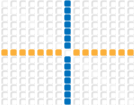Radnóti Miklós: Csak csont és bőr és fájdalom
Csak csont és bőr és fájdalom (Magyar)Babits Mihály halálára 1. Látjátok, annyi szenvedés után most pihen e hűvös, barna test. Csak csont és bőr és fájdalom. S akár a megtépett, kidőlt fatörzs évgyűrűit mutatja, bevallja ő is gyötrött éveit. Csak csont és bőr e test. De most a nemzeté is csak csont és bőr és fájdalom. Íme, Balázs, kihez könyörgött, vedd karodba! Ó, requiem aeternam dona ei… Domine!
2. Szavak jöjjetek köré, ti fájdalom tajtékai! ti mind, a gyásztól tompa értelem homályán bukdosó szavak, maradjatok velem: gyászold omló göröngy, sírj rá a sírra most! jöjj, könnyű testű fátyol ó, takard be, s akit már régen elhagyott a hang, - gyászold meg őt, te konduló harang, lebegő lélek és gömbölyű gyöngy, s gyászolj megint te csilla szó, te csillag, te lassú pillantású szó, hold, s ti többiek! ti mind!
3. Tudtuk már rég, minden hiába, rák marcangol és szemedben ott ragyog egy messzi és örök dolgokból font világ, s hogy oly időtlen vagy te, mint a csillagok.
Tudtuk, hogy meghalsz, tudtuk s mégis oly árván maradtunk most a Művel itt. Nagysága példa. És magasság. És szédület. Szívet dobogtató.
4. Ki nézi most tollat fogó kezünket, ha betegen, fáradtan is, de mégis... ki lesz az élő Mérték most nekünk? Hogy összetörte már a fájdalom, nézd, ezt a költeményt is. Mit szólnál hozzá? – lám az eljövő költőnek is, ki félve lép még most már a Mű a mérték.
S nem érti árvaságunk, ha bólintunk: halott már... nem ismert téged, ágyadnál nem ült, s nem ült az asztalodnál.
Nem tudja majd, mi fáj... s nem kérdi és nem kérdik tőle sem, – mint egymástól mi, – évek óta már, mint jelszót, hogy: „ki járt kint nála? Ki tudja mondd, hogy van Babits Mihály?”
5. Halott keze nem fogja már a tollat, béhunyt szeme nem lát több éjszakát. Örök világosság, kibomló égi láng röppen felé a földi füstön át.
|
Only Skin and Bones and Pain (Angol)On the death of Mihály Babits
1. See now, after all that suffering this cool brown body is at rest. Skin and bones and pain – that is all. And just as the torn, uprooted tree displays its annual rings, so he too admits to his tormented years. This body – but bones and skin. But now what is nothing but skin and pain and bones belongs to the nation too. See him, Blaise, whom he implored, take him into your arms! O requiem aeternam dona ei… Domine!
2. Come, words, to surround him, you surfbreakers of pain! all of you, words groping in the twilight of intellect dulled by mourning, remain with me: mourn him, crumbling clod of earth, weep down onto the grave! come, light-bodied veil, o cover him, and whom the voice has long since abandoned, mourn him now, tolling bell, hovering soul, and spherical pearl, and mourn once again, you gleaming word, you, star, you word of slow glance, o moon, and all you others! all!
3. We have known for long, all is lost: cancer tears you, and that in your eyes there shines a world woven of far and eternal things, and that you are as timeless as the stars.
We knew you were dying, we knew, and yet remained so orphaned with the Oeuvre here, down below. Its magnitude is exemplary. It is sublimity. It makes the heart beat faster. And is vertigo.
4. Who shall now look on our pen-holding hands, if in illness, in fatigue, but still?… who shall be our living Measure now? Look how pain has broken even this poem. What would your judgment of it be? See, for the coming poet too, as yet shy of his steps, the published Work is the standard.
Nor does he comprehend our orphaned state when we nod: yes, dead now… He never knew you, never sat at your bedside or at your table, either.
He will not know what hurts… And will not ask, nor will they ask of him, as we have of one another – for years now, like some password: “Who was out there to see him? Tell me, who knows how Mihály Babits is doing?”
5. No longer does his dead hand hold the pen, his shut-down eyes will see our nights no more. Eternal light, heaven’s unfolding flame, flies to greet him past this earth’s dense smoke.
|



